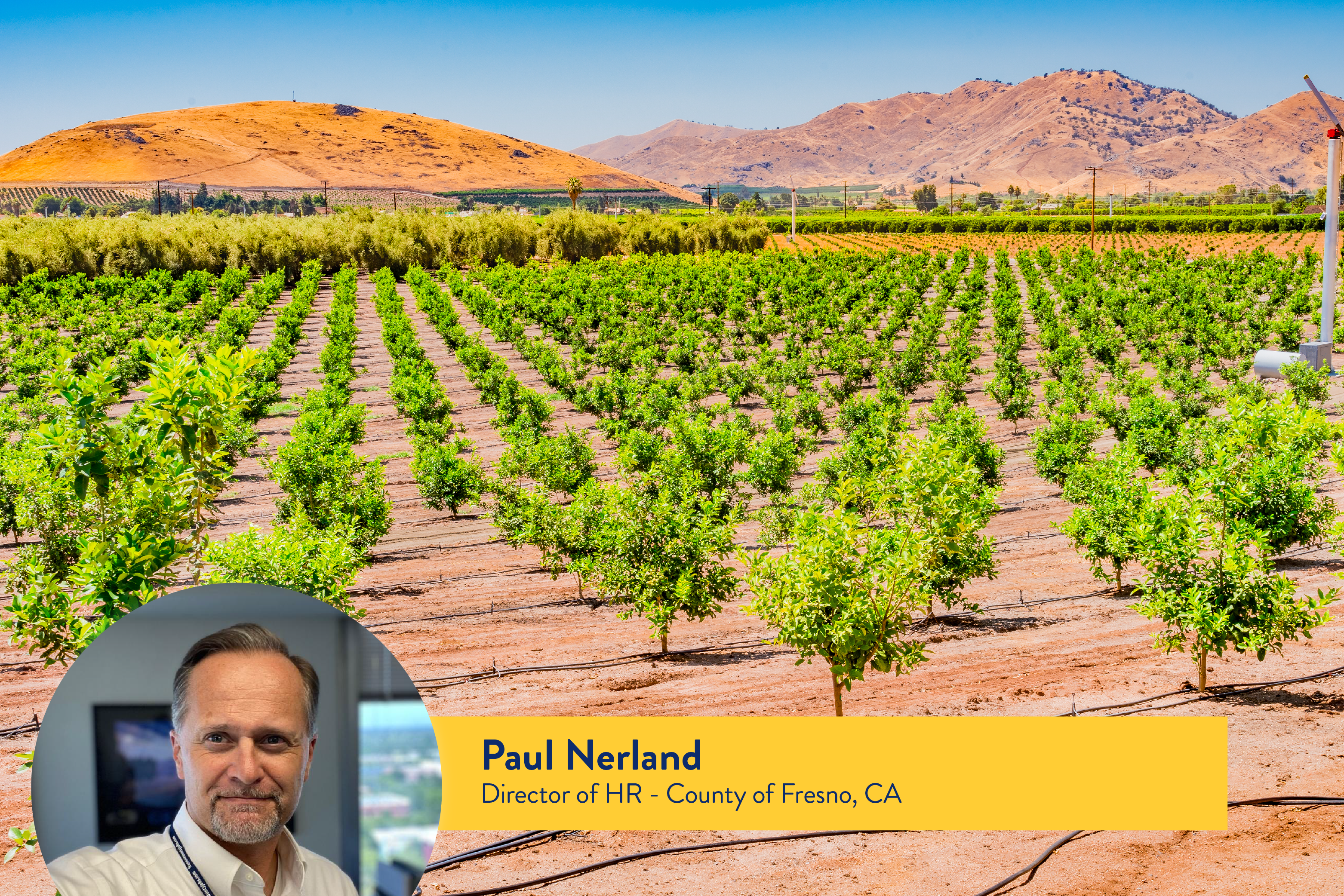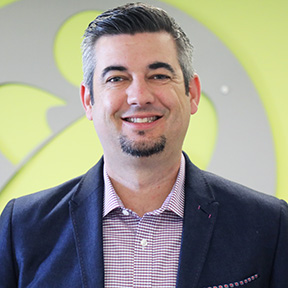
Paul Nerland, Director of HR, County of Fresno, CA
On this episode of The 3rd Question, Paul Nerland, Director of HR for the County of Fresno, CA talks about what it's like to be a public servant in his "home" for over 20 years and working by the motto of "we exist to assist."
Video Transcript
Ryan James:
Welcome to The 3rd Question, a video interview series with public sector thought leaders from around the country. I'm your host, Ryan James, and today I'm lucky enough to be joined by Paul Nerland, who is the CHRO for Fresno County here in California, where I get to live as well. Paul, thank you so much for joining us today.
Paul Nerland:
Hi, Ryan. It's great to be here. Thank you.
Ryan James:
And you get the California weather. So that's a nice thing to be able to take advantage of.
Paul Nerland:
That's one nice thing about telework, is we can sit outside in this beautiful weather.
Ryan James:
Very much so. Well, before we get into the three questions, let me ask if you could share with our audience a little bit about yourself, maybe your history in the public sector, and specifically around the county of Fresno.
Paul Nerland:
Absolutely. So again, my name is Paul Nerland. I was originally from Calgary, Alberta, Canada, moved to California in 1987 and worked for the county of Fresno. I've been with the county of Fresno since 1997, and all of that time has been in different human resources type function. So I've kind of grown up at the county, if you will. The county, if you don't know much about it, we're definitely an aid county. In many ways, we feed most of the nation. It's also a beautiful county. For those who haven't been here, we're near three national parks. So if you like hiking, if you like rivers, if you like lakes, this is the place to be. We're close to everything. It's a great place to raise a family, and very proud to be here. So being a public servant in my home is just something I'm very proud of and very happy to be part of.
Ryan James:
That's great. Thanks. All right. Well, let's get into our questions. The first question I have for you, Paul, is the fact that you have been with the county for over 20 years now, the last five have been in charge of HR as the CHRO. What have been some of your top initiatives and goals that you've had, let's say in the last year or two, but also how has the current pandemic we've been dealing with with COVID changed maybe some of those goals or the timeline of those goals, or maybe changed them completely?
Paul Nerland:
That's a great question, Ryan, and I was thinking about that. When I came in as the Director of Human Resources here at the county, one of the things I've found is the way that human resources was perceived in county government. When I talked to people across the county about, "What do you think of HR?" Many of them would look at human resources and think that it was more of a hindrance than a help and that really concerned me. So coming in knowing we were working so hard, why was that the case? And so what I wanted to do was really change our message and the perception of who we are, that we were not just a strategic partner, but frankly, we were critical to the success of every part of the county, and so really did a lot of listening and tried to rebrand and refocus, even on the culture in our own department as far as who we were. Sometimes human resources, when you think about it, you think about, "Well, what does HR do?" "Well, you can't do this and you can't do that," and some people, that's all they know of HR, where my message was, "Well, you can't do that, but there's some other great things you could do. Let's work together and see if we can find a solution."
And so that's been really the part of my job that's been the most fascinating and the most fun, and so really we came in ... and it started with the culture in our own department. How do we change that culture? And I'm not saying everyone had that mentality. We were just focusing on our jobs. We formed a committee internally to try to figure out even a mission statement that makes sense, that is memorable, and we put together a committee. I thought I wrote the most eloquent mission statement that sounded fantastic, and I'm thankful that my committee was honest enough to say "Now Paul, that sounds great, but we'll never remember it. It doesn't mean anything." So someone on the committee came up with just less of a mission statement and more of a motto, and that motto sticks for our department and that is "We exist to assist." That is why we are here, and so frankly, during this COVID-19 pandemic, we are involved in probably more things than we've ever been involved with, and HR, I think, if you were to talk to our department heads, is perceived as not just a strategic partner, but as essential. So we're not just involved even in your typical HR functions, they're bringing us into other things, which we're happy about.
Ryan James:
Yeah, you guys become the forefront of the organization in a lot of ways because of COVID.
Paul Nerland:
We've got departments right now with COVID-19 that are facing unique challenges that they've never faced before, and I think that we've risen to the challenge, we've met the moment, and we've got a team that's come up with creative solutions, but that has been probably the initiative and the focus that has brought me the greatest joy, because I think I've actually seen the perception change, and seeing that change, where HR is not an afterthought or HR is not something that's dismissed, but actually seen it as a huge value, it's been really rewarding, and then our employees, I think see we're part of something bigger. We're part of something that's critical to the success of the organization.
Ryan James:
One of the things that we often see, and I don't know if you'd agree or disagree with this, but is that typically public sector organizations seem to lag a little bit behind the private sector when it comes to the adoption and use of technology, specifically as it relates to the employees themselves, the public servants of the organization. For your organization, what have been some of biggest challenges around technology adoption, because you have this multi generational workforce, multi diverse functional workforce, and specifically, what are the challenges been when you're really focused on employee engagement, employee empowerment, and education?
Paul Nerland:
That's a great question. There's a story that I like to tell a lot of my team members and I tell in training of my own start at the county of Fresno back in 1997. I was a young whippersnapper who thought I knew a few things and came into the organization, and I remember coming in seeing processes that to me seemed antiquated and seemed outdated. In fact, some of them just made no sense, stacks of reports that were just putting it in the corner and nobody knew why, but we just did it, and I would ask people and nobody knew why. So I remember asking a senior executive, "Why do we do this? Can you explain it to me?" And her answer to me just still sticks with me to this day. She said, "Well Paul, it's oral tradition."
And I had this feeling of a torch being passed. Don't ask, it's just something that we do. I feel like in county government, many times that's the case, is we've got these practices, including technology, where we've always done it this way, we don't really question why, and that's been a problem. So over time, what have we done about that? Part of it, you mentioned employee engagement. I think there was a time when probably employees would have ideas and they were not welcomed. This is just the way we do business and we're really not going to be considering that. I think what's changed, at least at the county of Fresno, is we've certainly gotten much more progressive in one, listening to our employees, and that includes things like recruitment. How are we reaching out to our employees in the community? Are we using technology that's actually speaking their language? Are we adopting technology that makes us more efficient?
And you mentioned the pandemic. The pandemic has been obviously very difficult, but the challenges that we're overcoming I think are making us better. For example, if you would have told me a year ago that I would have the majority of my workforce teleworking and we're not missing a beat, I would have said no way. It's showed us that we can do it. We've got an IT department that has risen to the challenge, and we've actually been able to do it. I would say right now we're more in the catching up phase and I think we're doing a great job, but where we'd like to be is cutting edge, and even the view that say millennials as a generation have of county government is often old or antiquated. So we're slowly turning that around, but that continues to be a challenge, but I think we're meeting it.
Ryan James:
The one thing I will say that I've seen kind of across the country is that typically the decision making and change process in government tends to be long, longer than maybe it needs to be, and what COVID has shown, and you use some great examples. You've got the strength from an IT perspective that you can actually make decisions and make changes much, much more quickly than maybe the perception or the way that things always used to be.
Paul Nerland:
I think the other key, Ryan, is you've got to have trust among department heads and leadership, and you probably know in government, not just county government, but any government, departments can become fiefdoms, where maybe there's an idea that departments need to collaborate, but if departments don't trust each other, there's this idea of, "Well, I can't share this information with you because I might lose resources and I don't want to do that." So we duplicate resources and become very inefficient. I think we're trying to develop an environment where there's trust, where we work together and show we can actually do better together, and it's bearing fruit. We've got a ways to go, but it's bearing fruit.
Ryan James:
That's a great point. That's a great point. All right, well we're at the third question already, and for you today ... I pick a different time machine for every person I interview. I've got the DeLorean, the book The Time Machine by H. G. Wells, but you get the Tardis from Doctor who. So that's what your time machine is going to be today, Paul. And if I gave you this ... I mean, as someone who's basically had your whole career in the public sector, public service space, if I gave you the Tardis from Doctor Who and said you could go back to any point in your career or even your current role at Fresno or your time at Fresno, what would you tell yourself or what would you change and why?
Paul Nerland:
That's a great question, and I watched some of your other interviews, Ryan. I noticed somebody said, "Well I wouldn't change it because I'd missed the experience," and that's a great statement because I've learned so much across the way, but I think what I would say most of all is surrounding yourself with good people, and when you surround yourself with good people in leadership, if they've got good morals, if they're good people with good skills, especially just who they are, we can do everything, we can do anything. You can put them on anything, managing people and processes. I don't care what their background is, that's the case, and then I think the second thing would be ... although I know this, sometimes I get so focused on getting things done that I'm always looking for the next thing.
I'm looking outward, and if I'm not careful, I need to make sure that I'm focusing on my own people. I love the famous quote that, "I've learned that people will forget what you said, people will forget what you did, but people will never forget how you made them feel," and I've had the privilege over my career that I've had some people that made me feel very rewarded for what I did. That's what I would remind myself, was just don't forget that. Stop, write a thank you note to that person who did a great job. That's the most effective employee recognition program that we could ever have, and reward your people, because if you do that, they're really the key to success. I'm here, but without them, I really can't have the success that we have in any organization. That's what I would say, and I feel like I knew that, but I think sometimes we need reminders to just stop and just say thank you to our people.
Ryan James:
Yeah. Yep. Well Paul, I really appreciate you taking the time to answer three questions with me today, and I would say to our viewers, if you want to see more interviews like this, you can go to the3rdquestion.com. You can subscribe and be notified when we have more interviews with public sector thought leaders like Paul. Paul, thank you again. Really appreciate your time and I look forward to talking again, hopefully in the future.
Paul Nerland:
Sounds good, Ryan. Thank you very much. Have a great day.

